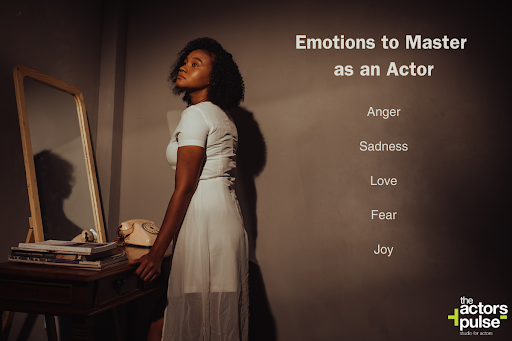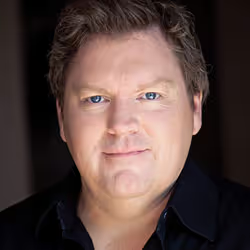How To Develop Your Emotional Range As An Actor

Possessing a great emotional range as an actor is vital to achieving long-term success within the industry.
The best and most successful actors are usually those with a very broad emotional range who can adapt their performance to align with any required emotion.
Not only can they do this convincingly, but often with quick transitional periods between emotions, often in the same scene.
In this way, not only does your emotional range create a more compelling performance but can make you more sought after as an actor too.
In this article, we’ll take a closer look at emotional ranges in acting, covering what it means, why it matters and how to develop your range as an actor.
What Is Meant By ‘Emotional Range’?
In acting circles, your emotional range refers to your emotional range of expression.
However, this term does not only encompass how many different emotions you can effectively implement in your acting but also how realistically you can portray them.
Just as you can have a broad emotional range and easily move between emotions with ease, the reverse can also be true.
Where one actor may excel at humorous, joyful expression another may shine in roles where grief or sorrow is required. If they are unable to transition between these emotions or portray one convincingly, they may be considered to have a narrow emotional range.
Why Does It Matter?
Nobody particularly wants to watch one-dimensional characters with limited emotional depth and just as equally, no actor should desire or enjoy roles that demand this.
An actor’s job is to connect with their audience and tell a story and the key to creating these compelling performances is to have a well-developed emotional range.
Being able to genuinely act out a wide range of emotions enhances an actor’s ability to communicate nuances in human emotion – keeping audiences engaged and immersed.
You need to invest in the development of your emotional range to avoid becoming pigeonholed as an actor. Leading to reduced opportunities and/or a repeating series of similar roles that will stifle your career growth and longevity.
For this reason, every actor should be committed to the ongoing development of their emotional range.
The Top Five Emotions To Master
Psychologist Robert Plutchik suggests in his theory of emotions that humans are capable of experiencing over 34,000 unique emotions.
Considering this you may, understandably, feel a little lost as to where to begin with the development of your emotional range.
Thankfully, there are just five primary emotions that most acting coaches will advise you to focus on and master first.
These are:
1. Anger
Typically an easy emotion for most of us to connect with, anger in acting, however, requires greater subtlety. It’s not just down to an aggressive delivery and heightened volume.
2. Sadness
Can you cry on command? If you can’t, don’t be too worried, tears are often overused to express sadness and can appear manipulative or self-pitying.
Emoting true sadness is far more nuanced than squeezing out some tears, so be sure to spend time developing this skill.
3. Love
An emotion that can be displayed and expressed in so many ways, genuinely accessing this and acting it out authentically can still pose a challenge for many actors.
4. Fear
Often ranked as one of the hardest emotions to develop and master, a genuine portrayal of fear requires a lot of practice and can be mentally exhausting to achieve.
Many actors tap into their more primal instincts and have to really give in to these to deliver a believably fearful performance.
5. Joy
Joy may seem like an easy emotion to master in your range, however, it can be surprisingly difficult to do convincingly.
False joy has the potential to ruin a moment or make it appear comedic or cliched. Finding ways to trigger genuine joy within yourself during a scene is the best way to go, but like all emotions, it takes time and practice to achieve.

Is That All?
But what about surprise, disgust, jealousy, envy, embarrassment, shame, anxiety, boredom, guilt, hatred? The list goes on…
Many of these are closely tied to the five primary emotions listed above and once you have these pinned down, it becomes easier to introduce additional emotions or variations of these into your range.
Ways To Develop Your Emotional Range
So how can you further develop and enhance your emotional range? There are several ways to go about this including but not limited to.
Practicing Self-Awareness
Taking the time to understand your emotions and how you react in different situations is essential for any actor seeking to deliver an authentic performance.
Becoming An Observer
We often talk about people-watching in terms of learning how people move and interact, however, it is also a valuable tool for emotional development.
By observing people in a variety of situations we become more attuned to differences in how emotions manifest in different individuals and how this influences their tone, facial expressions and body language.
Cultivating Empathy
Some of us are naturally more empathetic than others which can make emotive acting easier to do. For those who don’t frequently experience this feeling, try putting yourself in another’s shoes and sitting with the emotions this brings up.
This can help you connect more deeply with and better understand different perspectives and experiences which in turn broadens your emotional range.
Attending Acting Classes
Acting workshops and classes that focus on emotional expression can be very effective for the development of your emotional range as an actor.
Not only will you learn from professionals in this space but this also provides an excellent opportunity to receive feedback. This allows you to pinpoint areas for improvement and refine your approach.
Engaging In Improvisational Exercises
Regularly practising improv or engaging in improv activities is a great way to test yourself in unexpected situations and push yourself.
This can support a broadening of your emotional range and aid in a more honest delivery of these responses.
Read Widely
Exposing yourself to a wide variety of written material such as scripts, plays and literature that specifically focuses on and explores emotional themes can provide great inspiration.
It may introduce emotional landscapes and perspectives you’ve not experienced or understood well previously, giving more insights and therefore depth to your performances.
View A Variety Of Media & Performances
Just like reading, watching and studying a range of media and performances from seasoned actors is a fantastic educational tool.
Pay attention to how effectively different emotions are conveyed and the techniques used to do this. You can then try incorporating some of these into your acting and find which ones feel right for you.
Experiment With Different Roles
Try stepping outside of your comfort zone and experimenting with roles and characters that push you to explore different facets of your emotions.
This helps you expand your emotional range and can help you discover a talent or enjoyment for a completely different type of acting.
Try Meditation
Meditation and mindfulness exercises are fantastic ways to connect with yourself and achieve a greater emotional awareness.
They can also aid in learning to control our emotional responses for a more measured performance.
Exercising
Developing your emotional range is not only about the mind, it also involves connecting with your physicality. Yoga and movement classes combine aspects of both mindfulness and physical expression.
If you struggle with how to access your emotions and convey them through body language in a natural way, these activities are highly recommended.
Sit With Past Experiences
Drawing on past experiences and using the feelings associated with these to guide your performances can help you deliver emotions more authentically.
A core component of method acting, this practice can be highly effective, however, it is important to find the right balance in doing this.
Delve too deep into painful or traumatic memories and you could easily become overwhelmed and lose focus.

The Value Of Feedback
Becoming a great actor relies heavily on how other people perceive you. No matter how great you think you are or how well you think you’re nailing the emotional aspects of a role, it is essential that you actively seek out feedback.
Ideally, this is from those who are best positioned to provide constructive feedback such as your acting coach, industry experts, peers, directors or similar.
While watching back your performances and critiquing them is beneficial, this is not sufficient enough. Only through another’s eyes and feedback can you properly reflect on your performance and identify key areas for improvement.
Try to seek feedback from a variety of individuals rather than just your acting coach for example, as this will ensure a more well-rounded approach that accounts for multiple perspectives.
Invest In Developing Your Emotional Range With The Actors Pulse
At The Actors Pulse, we wholly embrace an instinctual, natural approach to acting as part of the Meisner Technique.
Through our classes, our students learn how to embrace their own emotions and develop their range for authentic, compelling performances.
Our curriculum is designed to equip you with the skills and techniques necessary to excel on stage or screen and confidently undertake even the most complex of characters.
Embrace your feelings, empower your performances and push yourself further with the support of our experienced acting coaches. Contact The Actors Pulse today at 0414 475 515.
Start today!









Contact Us
Get in touch with us using the form or details below. We look forward to hearing from you!









